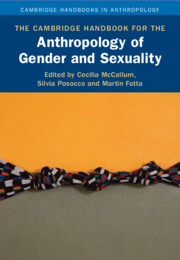Book contents
- The Cambridge Handbook for the Anthropology of Gender and Sexuality
- Cambridge Handbooks in Anthropology
- The Cambridge Handbook for the Anthropology of Gender and Sexuality
- Copyright page
- Contents
- Contributors
- 1 Introduction to The Cambridge Handbook for the Anthropology of Gender and Sexuality
- Part One Openings and Orientations
- Part Two Knowledges and Domains
- 6 Gender, Sociality, and the Person
- 7 The Postmodern Moment in Gender Studies and Anthropology
- 8 Gender(ed) Language and the Linguistics of Sexuality
- 9 Conceptualizing Bodies, Hierarchy, and Gendering across Cultures
- 10 Language, Gender and Sexuality, and Performativity
- 11 Anthropological Engagements with Men and Masculinities
- Part Three Resistances and Intersections
- Part Four Desires and Relations
- Part Five Recursivities and Futures
- Name Index
- Subject Index
- References
6 - Gender, Sociality, and the Person
from Part Two - Knowledges and Domains
Published online by Cambridge University Press: 29 September 2023
- The Cambridge Handbook for the Anthropology of Gender and Sexuality
- Cambridge Handbooks in Anthropology
- The Cambridge Handbook for the Anthropology of Gender and Sexuality
- Copyright page
- Contents
- Contributors
- 1 Introduction to The Cambridge Handbook for the Anthropology of Gender and Sexuality
- Part One Openings and Orientations
- Part Two Knowledges and Domains
- 6 Gender, Sociality, and the Person
- 7 The Postmodern Moment in Gender Studies and Anthropology
- 8 Gender(ed) Language and the Linguistics of Sexuality
- 9 Conceptualizing Bodies, Hierarchy, and Gendering across Cultures
- 10 Language, Gender and Sexuality, and Performativity
- 11 Anthropological Engagements with Men and Masculinities
- Part Three Resistances and Intersections
- Part Four Desires and Relations
- Part Five Recursivities and Futures
- Name Index
- Subject Index
- References
Summary
The chapter traces how anthropologists reconfigured theorizing the social through gender-sensitive ethnographic work, which led to a turning away from the “society thinking” rooted in liberalist humanism, to a greater emphasis on process and on notions of sociality and the person. An appreciation of Marilyn Strathern’s contributions to this reconfiguration, at distinct moments of its history, structures the discussion, which is elaborated with reference to ethnographic analysis. Thus, the central section of the chapter considers ethnography of Indigenous Amazonian peoples, to discuss the relationship between naming, practices of the person (rather than personhood as a state), and lived sociality. This leads to a reappraisal of Mauss’s foundational essay on the person. In the penultimate section, the chapter sets out current debates on the “dividual” or “partible person” with respect to distinctions between “relationalist” and “individualist” conceptual fields of personhood. Finally, it explores how anthropology has come to investigate power and difference as part of the constitution of historically emergent personhood.
- Type
- Chapter
- Information
- Publisher: Cambridge University PressPrint publication year: 2023

